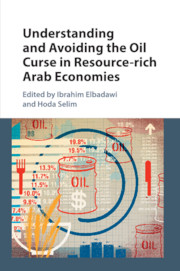Book contents
- Understanding and Avoiding the Oil Curse in Resource-rich Arab Economies
- Understanding and Avoiding the Oil Curse in Resource-rich Arab Economies
- Copyright page
- Contents
- Figures
- Tables
- Contributors
- Foreword
- Acknowledgments
- 1 Overview of Context, Issues and Summary
- 2 The Global Impact of the Systemic Economies and MENA Business Cycles1
- 3 Real Exchange Rates and Export Performance in Oil-dependent Arab Economies*
- 4 Dutch Disease in the Services Sector
- 5 The Political Economy of Public Sector Employment in Resource-dependent Countries1
- 6 The Oil Curse and Labor Markets
- 7 Resource Rents, Political Institutions and Economic Growth*
- 8 Fiscal Institutions in Resource-rich Economies
- 9 Savings and Investment Decisions from Natural Resource Revenues
- 10 Labor Market Heterogeneity and Optimal Exchange Rate Regimes in Resource-rich Arab Countries
- 11 The Institutional Curse of Natural Resources in the Arab World1
- 12 Has the UAE Escaped the Oil Curse?
- 13 Understanding and Avoiding the Oil Curse in Sudan
- Index
- References
1 - Overview of Context, Issues and Summary
Published online by Cambridge University Press: 05 July 2016
- Understanding and Avoiding the Oil Curse in Resource-rich Arab Economies
- Understanding and Avoiding the Oil Curse in Resource-rich Arab Economies
- Copyright page
- Contents
- Figures
- Tables
- Contributors
- Foreword
- Acknowledgments
- 1 Overview of Context, Issues and Summary
- 2 The Global Impact of the Systemic Economies and MENA Business Cycles1
- 3 Real Exchange Rates and Export Performance in Oil-dependent Arab Economies*
- 4 Dutch Disease in the Services Sector
- 5 The Political Economy of Public Sector Employment in Resource-dependent Countries1
- 6 The Oil Curse and Labor Markets
- 7 Resource Rents, Political Institutions and Economic Growth*
- 8 Fiscal Institutions in Resource-rich Economies
- 9 Savings and Investment Decisions from Natural Resource Revenues
- 10 Labor Market Heterogeneity and Optimal Exchange Rate Regimes in Resource-rich Arab Countries
- 11 The Institutional Curse of Natural Resources in the Arab World1
- 12 Has the UAE Escaped the Oil Curse?
- 13 Understanding and Avoiding the Oil Curse in Sudan
- Index
- References
Summary
Despite being blessed with immense oil resources, Arab countries have neither achieved economic prosperity nor became developed countries. This chapter provides a brief overview of issues related to understanding the origins and symptoms of the resource curse and the challenges triggered by oil dependency in the Arab World including the traditional issues related to economic diversification, Dutch Disease etc. Among the novel issues explored are the interactions between oil windfalls and weak institutions (including fiscal institutions and optimal exchange rate regimes) as well as the role of political economy factors of the impact of resource rents on the strategies of the ruling elites to fend-off potential revolts that might remove them from power.
- Type
- Chapter
- Information
- Publisher: Cambridge University PressPrint publication year: 2016



